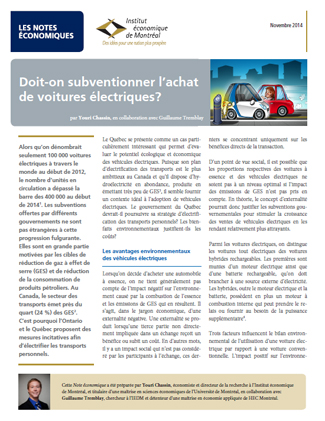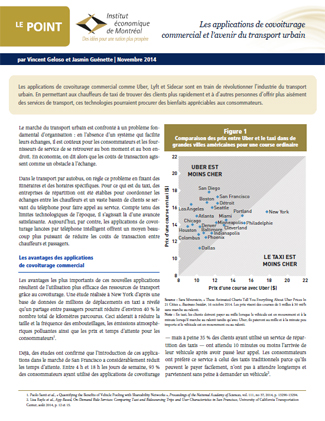
1-minute read
Can We Get Rid of Oil? The Costs of an Accelerated Energy Transition
Policies designed to accelerate the transition to green energy sources are usually presented in terms of their benefits, whereas costs are rarely discussed. This Research Paper proposes to fill this gap in the public debate. It examines the costs of proposals made by the Quebec environmentalist groups Équiterre and Vivre en ville for rapidly reducing oil consumption, as well as the willingness of Quebecers and other Canadians to pay those costs.

1-minute read
Do We Need to Subsidize the Purchase of Electric Cars?
While there were only 100,000 electric cars in the world at the beginning of 2012, the number of units on the road passed the 400,000 mark in early 2014. The subsidies offered by various governments have had a lot to do with this very rapid increase. These are motivated in large part by reduction targets for greenhouse gases (GHGs) and for the consumption of petroleum products. In Canada, the transportation sector emits nearly a quarter (24%) of all GHGs. This is why Ontario and Quebec are proposing incentives to electrify personal transportation.

1-minute read
Viewpoint – Ride-Sharing Applications and the Future of Urban Transportation
Ride-sharing applications like Uber, Lyft and Sidecar are currently revolutionizing the urban transportation industry. By allowing taxi drivers to find clients more rapidly, and other individuals to offer transportation services more easily, these technologies could lead to considerable improvements for customers. Sensible economic policy should avoid hindering their adoption by consumers while compensating those who are negatively affected by obsolete government regulations from the past.

1-minute read
Viewpoint – What Effect Do Payroll Taxes Have on Workers?
Of all the components of taxation in Quebec, payroll taxes are without a doubt the least well-known among the general public. While employees may indeed notice a discrepancy between what they receive and what their employers pay out, it is difficult to fully understand the reasons for this. Nor do employees know the magnitude of the sums that their employers must pay to the taxman in addition to the salaries they are paid. This Viewpoint aims to clarify the issue of payroll taxes in order to better grasp their impact on the remuneration of workers.

2-minute read
My Intellectual Journey: From Marxism to Liberalism
This 85-page trilingual booklet features the transcript of a talk delivered on October 16, 2013 in Montreal by Peruvian Nobel Laureate in Literature Mario Vargas Llosa on the occasion of a conference organized by the Montreal Economic Institute. In this talk, Mr. Vargas Llosa explains why, in his youth, he believed in communism, like many intellectuals of his generation, and also how, through his disillusionment and his questioning, he discovered another vision, one of liberty, tolerance and democracy.

1-minute read
The Positive Role of Profit in the Field of Health Care
Few topics of public debate elicit more emotion in people than the role of the private sector in health care. It is often argued that profit has no place in this sector, especially when it comes to hospital care. Some people think that the profit motive would encourage "the cutting of corners," that profit would add to the cost of providing a service, or that for-profit medical facilities would avoid the more complex cases or those perceived to be "less profitable." Are these beliefs justified?

1-minute read
Solutions for Municipal Pension Plans
The pension plans of municipal employees across the province of Quebec face deficits totalling $3.9 billion. For certain municipalities, pension plan contributions have exploded over the past few years. The Quebec government recently introduced a bill whose purpose is to ensure the sustainability of these plans, but that does not call into question their underlying principles.

1-minute read
Viewpoint – Three Myths about Competition in the Canadian Wireless Sector
There are several myths going around regarding the state of competition in the Canadian wireless sector. According to critics, the lack of competition compared to other industrialized countries means that Canadians are among those who pay the most for their services ‒ services, moreover, that are of poor quality. The MEI recently delved into this subject in some detail. As a new round of CRTC hearings begins, during which wholesale roaming fees will be debated, we are revisiting the matter briefly in order to contribute to a more balanced debate.

1-minute read
What Role Do the Public and Private Sectors Play in Pharmaceutical Innovation?
The discovery and marketing of countless therapeutic drugs and vaccines over the past century has undeniably helped to revolutionize the field of health care. Despite the scope of this progress and the benefits that have flowed from it, the pharmaceutical sector continues to be the target of numerous criticisms. How are innovative drugs discovered and developed? What do the public sector and the private sector each contribute to the process? The purpose of this Economic Note is to shed some light on these questions.

2-minute read
Are Quebec’s Forests Threatened?
Environmental groups claim that logging is jeopardizing the future of our forests as well as the survival of the species that live in them. Is this an accurate picture of the reality of forestry in Quebec? The aggregate data do not show that our forests are in decline. On the contrary, forest cover has increased slightly between the first forest inventory in 1979 and the most recent one in 2002.

